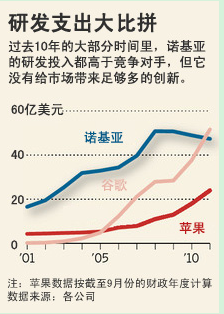(单词翻译:单击)

In late 2004, U.S. manufacturer Motorola scored a world-wide hit with its thin Razr flip-phones. Nokia weathered criticism from investors that it was expending too much effort on high-end smartphones while its rival ate into its lucrative business selling expensive 'dumb' phones to upwardly mobile people around the world.
2004年底,美国制造商摩托罗拉(Motorola)凭藉其轻薄的Razr掀盖式手机在世界上一炮打响。诺基亚遭到了投资者的批评。他们说,在竞争对手侵蚀其颇为赚钱的业务、向全球社会经济地位不断提高的用户销售昂贵的“傻瓜”手机时,诺基亚却在高端智能手机上花费了太多的精力。
After Olli-Pekka Kallasvuo, Nokia's former chief financial officer, took the helm from Mr. Ollila in 2006, he merged Nokia's smartphone and basic-phone operations. The result, said several former executives, was that the more profitable basic phone business started calling the shots.
2006年诺基亚前首席财务长康培凯(Olli-Pekka Kallasvuo)接替奥利拉担任首席执行长,之后他将诺基亚的智能手机和功能手机业务合二为一。该公司数位前高管说,结果就造成更为盈利的功能手机业务开始左右整体业务的发展。
'The Nokia bias went backwards,' said Jari Pasanen, a member of a group Nokia set up in 2004 to create multimedia services for smartphones and now a venture capitalist in Finland. 'It went toward traditional mobile phones.'
诺基亚2004年设立了一个为智能手机创建多媒体服务的集团。该集团成员帕萨宁(Jari Pasanen)说,诺基亚的侧重点倒退回去了,它走向了传统手机。帕萨宁目前是芬兰的一名风险投资家。
Nokia's smartphones had hit the market too early, before consumers or wireless networks were ready to make use of them. And when the iPhone emerged, Nokia failed to recognize the threat.
诺基亚智能手机的面市太超前了,当时消费者和无线网络还没有做好接纳智能手机的准备。此外,当iPhone出现时,诺基亚没有认识到它所带来的威胁。
Nokia engineers' 'tear-down' reports, according to people who saw them, emphasized that the iPhone was expensive to manufacture and only worked on second-generation networks-primitive compared with Nokia's 3G technology. One report noted that the iPhone didn't come close to passing Nokia's rigorous 'drop test,' in which a phone is dropped five feet onto concrete from a variety of angles.
据看过诺基亚工程师的“诋毁”报告的人说,报告中强调,iPhone制造成本高,只能用于第二代网络,这与诺基亚的3G技术相比太原始了。有一份报告说,iPhone距离能够通过诺基亚严格的“掉落测试”还差得远。在这个测试中,手机需要从五英尺高的高度以不同角度掉落到水泥地面上。
Yet consumers loved the iPhone, and by 2008 Nokia executives had realized that matching Apple's slick operating system amounted to their biggest challenge.
然而,消费者对iPhone爱不释手。到2008年时,诺基亚高管们已经意识到,要与苹果美妙绝伦的操作系统比肩是他们的最大挑战。
One team tried to revamp Symbian, the aging operating system that ran most Nokia smartphones. Another effort, eventually dubbed MeeGo, tried to build a new system from the ground up.
一个研发团队试图改造诺基亚大多数智能手机所使用的老旧的塞班(Symbian)系统,而另一个团队则试图从头开始打造一个名为MeeGo的全新操作系统。
People involved with both efforts say the two teams competed with each other for support within the company and the attention of top executives-a problem that plagued Nokia's R&D operations.
据曾经在两个研发团队工作过的人说,在争取公司内部支持以及高层关注等问题上两支团队相互竞争,这一问题困扰着诺基亚的研发业务。
'You were spending more time fighting politics than doing design,' said Alastair Curtis, Nokia's chief designer from 2006 to 2009. The organizational structure was so convoluted, he added, that 'it was hard for the team to drive through a coherent, consistent, beautiful experience.'
在2006年至2009年担任诺基亚首席设计师的柯蒂斯(Alastair Curtis)说,他们花在政治斗争上的时间比花在设计上的时间多。柯蒂斯还说,诺基亚的组织结构错综复杂,想要完成一个连贯、一致且美妙的研发过程对研发团队来说很难。
In 2010, for instance, Nokia was hashing out some details of software that would make it easier for outside programmers to write applications that could work on any Nokia smartphone.
例如在2010年,诺基亚召集工程师试图敲定一款软件的某些细节。这款软件能让外部程序员更加方便地编写出能够在任何一款诺基亚智能手机上运行的应用程序。
At some companies, such decisions might be made around a conference table. In Nokia's case, the meeting involved gathering about 100 engineers and product managers from offices as far-flung as Massachusetts and China in a hotel ballroom in Mainz, Germany, two people who attended the meeting recall.
在一些公司,可能只要在会议桌旁开个会就能做出此类决定。但据两位与会人员回忆,诺基亚却将大约100名工程师和产品经理召集到德国美因茨一家酒店的宴会厅内开会,他们中一些人甚至是从美国马萨诸塞州和中国远道而来的。
Over three days, the Nokia employees sat on folding chairs and jotted notes on an array of paper easels. Representatives of MeeGo, Symbian and other programs within Nokia all struggled to make themselves heard.
在三天的时间里,诺基亚员工坐在折叠椅上记着笔记。MeeGo、塞班以及诺基亚内部其它项目组都在努力发出自己的声音。
'People were trying to keep their jobs,' one person there recalls. 'Each group was accountable for delivering the most competitive phone.'
一位与会者回忆,大家都试图保住自己的饭碗。每个团队都有责任拿出最具竞争力的手机。
Key business partners were frustrated as well. Shortly after Apple began selling the iPhone in June 2007, chip supplier Qualcomm Corp. QCOM +2.92% settled a long running patent battle with Nokia and began collaborating on projects.
诺基亚的关键业务合作伙伴也感到非常沮丧。在苹果于2007年6月开始销售iPhone后不久,芯片供应商高通公司(Qualcomm Corp.)和诺基亚就一场专利持久战达成和解,双方开始在项目上展开合作。
'What struck me when we started working with Nokia back in 2008 was how Nokia spent much more time than other device makers just strategizing,' Qualcomm Chief Executive Paul Jacobs said. 'We would present Nokia with a new technology that to us would seem as a big opportunity. Instead of just diving into this opportunity, Nokia would spend a long time, maybe six to nine months, just assessing the opportunity. And by that time the opportunity often just went away.'
高通公司首席执行长雅各布(Paul Jacobs)说,2008年我们开始和诺基亚展开合作的时候,给我留下深刻印象的是,和其它设备制造商相比,诺基亚花在制定战略上的时间要多得多。有时我们会给诺基亚提供一项新技术,在我们看来,这可能会是一个巨大商机。不过诺基亚不是马上开始利用这个机会,而是花很长时间(可能要六到九个月)来评估这个机会。等到他们评估好了时,机会往往已从手中溜走了。
When Mr. Elop took over as CEO in 2010 Nokia was spending 5 billion a year on R&D-30% of the mobile phone industry's total, according to Bernstein research. Yet it remained far from launching a legitimate competitor to the iPhone.
研究机构Bernstein research的数据表明,埃洛普2010年担任CEO的时候,诺基亚每年的研发费用高达50亿欧元,这一数字占手机产业研发总经费的30%。但诺基亚始终没有推出一个足以和iPhone相匹敌的机型。
Before the latest round of cuts, he said, the company was still struggling to focus on useful R&D. Mr. Elop has sifted through data and visited labs around the world to personally terminate projects that weren't core priorities-like one to help buyers in India link their phones to new government identification numbers.
雅各布说,在最近这轮裁减成本之前,诺基亚仍然未能很好地把精力集中到有用的研发项目上。埃洛普仔细审查数据,拜访位于全球各地的实验室,亲自终止那些非重点项目,比如一个可以将印度用户的手机同新公布的政府身份识别码联系在一起的工具。
Mr. Elop is refocusing around services like location and mapping, which came with the company's $8 billion 2008 acquisition of Navteq.
埃洛普重新将业务重心放到定位和地图服务上。诺基亚2008年花80亿美元收购Navteq之后获得了其定位和地图业务。
But he is having trouble rolling out products that catch on with consumers. Nokia's latest phone, the Lumia, has been well reviewed, but sales may suffer as consumers hold out for the next version of Microsoft's software, due later this year.
但在推出受消费者欢迎的产品一事上埃洛普碰到了麻烦。诺基亚新出的手机Lumia虽受好评,但由于消费者在微软下一代操作系统软件今年晚些时候推出前不愿购买这款手机,Lumia的销量可能会受到影响。
Jo Harlow, whom Mr. Elop appointed head of smartphones shortly after he became CEO, said Nokia will launch lower-priced Lumia devices in the coming months to better compete with aggressive Asian device makers such as China's Huawei Technologies. Ms. Harlow said the company is also 'very interested' in entering the tablet market.
埃洛普成为CEO之后不久任命的智能手机业务主管哈洛(Jo Harlow)说,诺基亚将在未来几个月内推出低价Lumia手机,以便更好地同中国的华为技术有限公司(Huawei Technologies)等雄心勃勃的亚洲手机厂商竞争。哈洛还说,诺基亚也对进入平板电脑市场“非常感兴趣”。
Mr. Elop has shaken up a sales and marketing department, replacing Chief Operating Officer Jerri DeVard and two other executives after the Lumia launch. In June, Mr. Elop picked Chris Weber, a 47-year-old former Microsoft colleague who had been running Nokia's North American effort, to take over. Ms. DeVard couldn't be reached for comment.
埃洛普对销售和营销部进行了一次很大的人事调整。在推出Lumia手机之后,埃洛普换掉了首席运营长德瓦德(Jerri DeVard)和另外两名高管。今年6月,埃洛普挑中他在微软时的同事、现年47岁的韦伯(Chris Weber)接手德瓦德的工作。记者无法联系德瓦德置评。
Nokia still is struggling to turn its good ideas into products. The first half of the year saw Nokia book more patents than in any six-month period since 2007, Mr. Elop said, leaving Nokia with more than 30,000 in all. Some might be sold to raise cash, he said.
诺基亚在将良好创意转变为产品方面依然表现得不尽如人意。埃洛普说,今年上半年诺基亚提交的专利数量是自2007年以来半年时间内最多的。诺基亚申报的专利总数超过3万件。埃洛普说,可能会出售一些专利以筹集现金。
'We may decide there could be elements of it that could be sold off, turned into more immediate cash for us-which is something that is important when you're going through a turnaround,' Mr. Elop said.
埃洛普说,我们可能会决定出售部分专利,以筹集我们更为急需的现金。当企业处在扭亏为盈阶段时,现金很重要。


